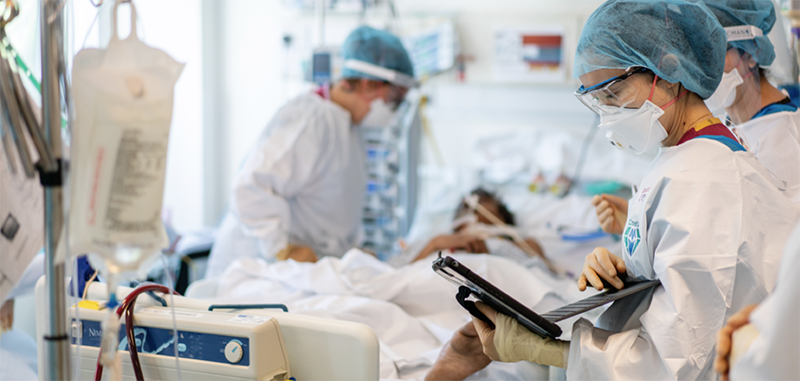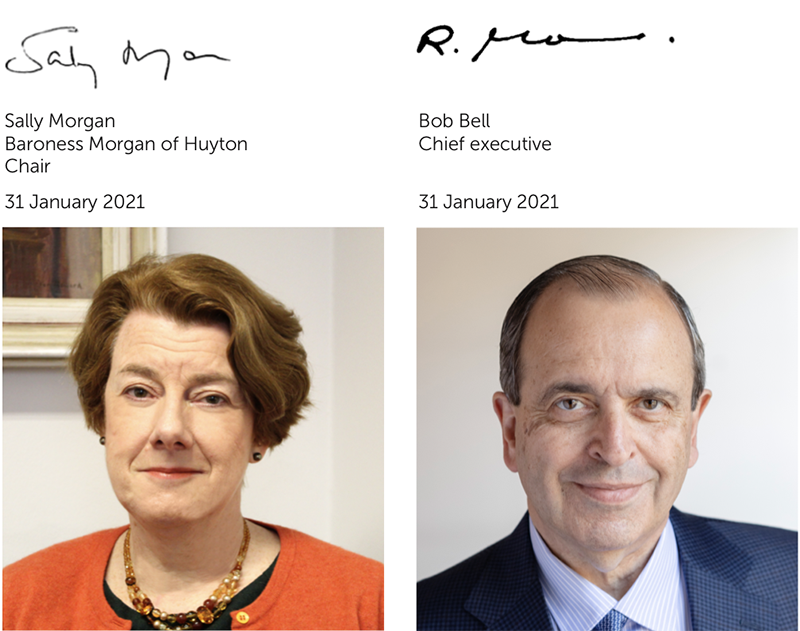It is hard to find the right words to chronicle the extraordinary circumstances that emerged in the period covered by this report.
At the start of 2020, nobody predicted the chain of events that was about to unfold across the globe. On 5 January, the World Health Organization (WHO) announced that 44 patients with ‘pneumonia of unknown etiology’ had been reported by the national authorities in China. It is fascinating to reflect on those early days. To quote from the WHO news release: “Based on the preliminary information from the Chinese investigation team, no evidence of significant human-to-human transmission and no healthcare worker infections have been reported.”
Of course, we now know just how destructive this new virus would be, devastating whole countries and taking the lives of over two million people by the end of January 2021. The first phase of the pandemic saw our organisation cope with unprecedented levels of activity, in extremely challenging circumstances.
As part of a London-wide and national response, both our hospitals nearly tripled their critical care capacity to accommodate just under 100 ventilated patients. This required enormous flexibility and commitment on the part of all our teams, many of whom took on new and challenging roles to enable us to meet the demand for expert critical care, re-skilling in a matter of days. As one of only five adult centres for ECMO (an advanced form of life support) in England, at one stage in mid-April Royal Brompton supported 26 COVID-19 patients, with our Trust’s cumulative ECMO caseload being one of the highest in Europe.
At the request of NHS England, we consolidated our specialist paediatric heart and lung patients at children’s hospitals elsewhere in London, and our paediatric intensive care teams immediately stepped in to support the care of COVID-19 adult patients in our intensive care units.
The response from our staff to these unprecedented circumstances was exceptional. We remain deeply proud of the way our teams responded to such an immensely difficult situation, putting patients before themselves, working long hours in unfamiliar environments, and supporting each other in ways that had never been seen, or needed, before. They achieved things that were truly remarkable, while at the same time furthering knowledge about, and understanding of, COVID-19, on a national and international stage.
In addition to its role treating COVID-19 patients, Harefield was designated one of two centres in London to maintain essential cardiac surgery. Cardiac specialists from both our hospitals, and colleagues from Guy’s and St Thomas’ NHS Foundation Trust and Imperial College Healthcare NHS Trust, worked closely together with pooled waiting lists. A daily cardiac clinical hub meeting ensured all patients were appropriately triaged according to their clinical need.
At Royal Brompton, clinical teams continued to care for heart and lung patients who needed emergency treatment throughout the pandemic, but the higher number of COVID-19 patients being cared for meant that most cardiac activity was diverted to Harefield. Our cancer programme was delivered by the west London Cancer Alliance, hosted by Royal Marsden. Harefield’s transplant programme continued throughout.
Saying thank you to our dedicated teams for their hard work, commitment and flexibility during such a challenging time has felt completely inadequate. When we reflect on what our Trust accomplished, each and every person that contributed should be tremendously proud. Their determination to provide the very best patient care, whatever the circumstances, has been inspirational and their resilience in the face of some very real challenges, extraordinary.
The real thanks, of course, comes from our patients and their families, and we have been fortunate enough to be included in many messages of gratitude and thanks. By Christmas 2020 there were 100 families whose loved ones have been returned to them thanks to the skill and dedication of our expert teams. One hundred lives saved, and husbands, wives, daughters, sons, grandparents and grandchildren given back a future that they feared had been taken away forever.

Merging with Guy’s and St Thomas’
Colleagues at Guy’s and St Thomas’ were a source of support on many levels during the first phase of the pandemic, as we were for them. Many relationships were strengthened and as we assessed new and better ways of delivering our services, it became clearer than ever that the collaboration between our two trusts would provide significant opportunities to excel in patient care.
We were delighted when both the Board and Council of Governors had the foresight and ambition to approve our application to merge with Guy’s and St Thomas’ Foundation Trust in late 2020.
When we began our discussions with Guy’s and St Thomas’ in 2016, we recognised that there was a real opportunity to benefit from the scale of a larger Trust and its associated security, while also retaining the identity of our two famous hospitals. Being part of an integrated hospital system will provide immense benefits; together we will be stronger.
Healthcare will undergo radical transformation over the next 10 years and as healthcare providers we need to respond. From our earliest discussions with Guy’s and St Thomas’ we realised we had the chance to create something new and dynamic with colleagues who shared our values and our appetite for innovation and transformation, which is vital if we are to break new ground in heart and lung disease treatment and research and in turn, transform patient care.
This is a genuine milestone for the NHS. Our merged organisation will put the UK’s heart and lung care and research at the forefront of global efforts to combat these two debilitating diseases, which still account for many millions of deaths each year.
Patients will now be part of a dynamic and innovative network giving direct access to a wide range of medical expertise, from primary care right through to specialist care for rare conditions. We will continue to work closely with them as we take forward our plans.

< Contents
About us >
